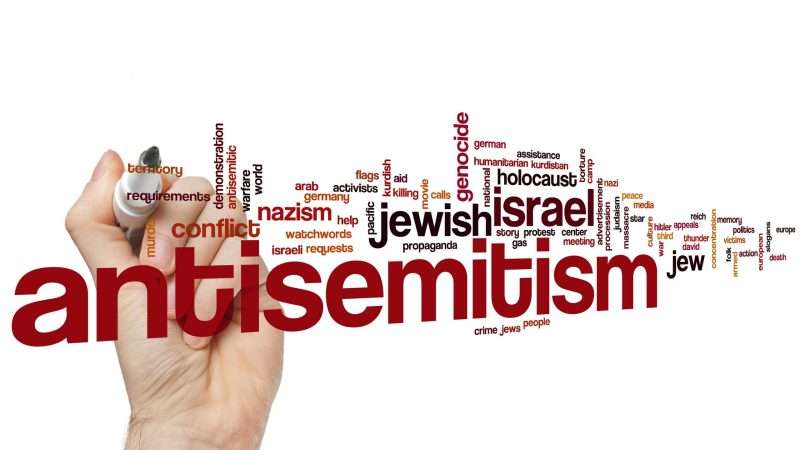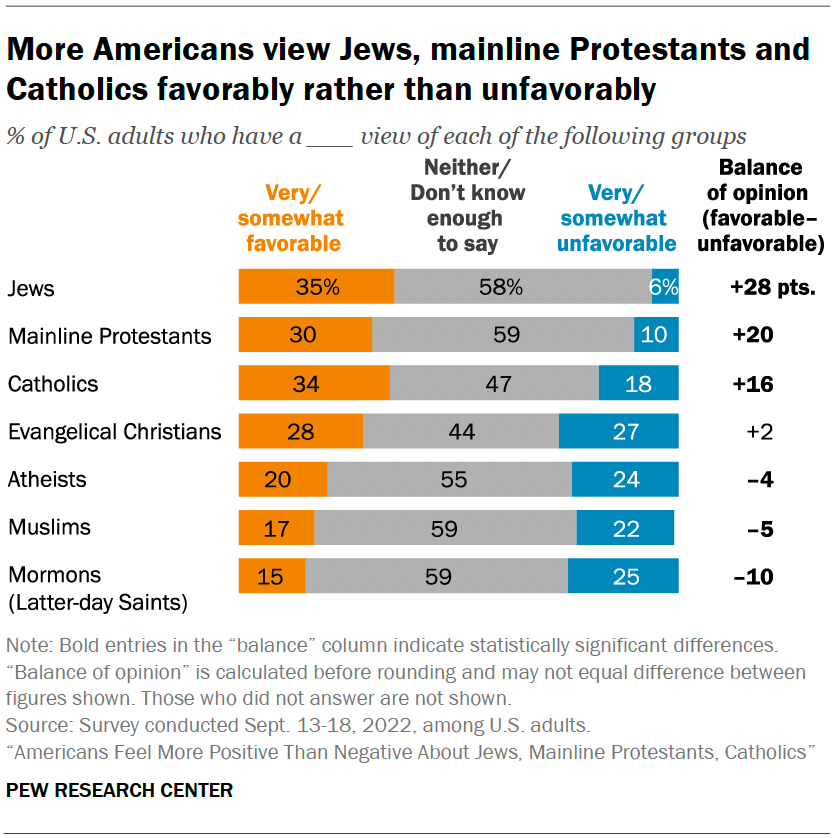

A recent Harvard/Harris question indicating that 67% of Americans between the ages of 18 and 24 believe Jews "as a class" are "oppressors" has attracted widespread attention as an indicator of widespread anti-Semitism. There is indeed reason to be concerned about anti-Semitism, including that on the political left and on college campuses. But we should not give much weight to this survey question. It's badly worded and at odds with other data.
Here's the question in full and results, broken down by age group:
Do you think that Jews as a class are oppressors and should be treated as oppressors or is that a false ideology?
While most of the focus has been on the 18-24 result, it's worth noting that large percentages of every other age group under the age of 55 also gave the "oppressors" answer: 44% of the 25-34 category; 36% of those aged 35-44, and 24% of those aged 45-54. Overall, 27% of respondents chose the "oppressor" answer. This looks like an implausibly high level of anti-Semitism even aside from the 18-24 group.
A likely explanation is that the question is badly designed. Before going into this, I should note that I have considerable background in public opinion research, and am the author of a number of academic publications on voter knowledge and ignorance, including my book Democracy and Political Ignorance (Stanford University Press). That doesn't make me a source of infallible wisdom in this field. Far from it! But it does mean I have relevant expertise on such matters, more so than at least some of the other commentators opining about this question.
There are multiple flaws in the way the question is designed, each of which may lead to skewed results. First, the question asks about two things at once: whether Jews, "as a class" are "oppressors" and whether they "should be treated as oppressors." This is a survey no-no because it leads to inaccurate results among respondents who agree with one of the statements, but not the other, and because a compound question can easily confuse respondents who don't read it carefully (which many don't).
A second problem is that the question uses terminology ("oppressors," "ideology") that may not be familiar to respondents who don't follow politics closely (which many studies show a large percentage of the public does not). If you're reading this post, you probably do follow politics closely, and may find it hard to believe that anyone is unfamiliar with terms like "ideology." Perhaps that's also true of all or most of your friends and relatives. Maybe none of them would be confused about such things, either.
But, if so, you and your social circle are highly unrepresentative. Most of the general public is not like that. A majority of Americans can't name the three branches of government, don't know when the Civil War happened, and support mandatory labeling of food containing DNA (the latter probably because they don't understand what DNA is). Political scientists also find that most of the public has little understanding of such basic political concepts as "liberal" and "conservative." It would not be surprising if the same was true of many survey respondents' understanding of "oppressor" and "ideology," though admittedly I haven't seen research specifically focused on these terms.
Furthermore, the question doesn't include any intermediate or "don't know" option. The resulting "forced choice" between relatively extreme options increases the likelihood of distortion and of eliciting "opinions" that don't really exist.
Finally, as I explained in a recent post on public ignorance about the Holocaust, extensive survey evidence indicates that political ignorance is higher among younger people than older ones. This is not a recent phenomenon unique to the "Z" generation, but has been a consistent finding through decades of public opinion research.
These flaws might not be a big deal if the result were consistent with other data on public attitudes towards Jews. But in fact it is at odds with much other evidence. I will illustrate with a few examples.
A September 2022 Pew Research Center survey on various religious groups—conducted in finds that Jews have higher favorability ratings than any other group included in the survey:

Significantly, only 6% of respondents had a "very" or "somewhat" unfavorable view of Jews—a lower percentage than for any of the other groups included in the survey (these figures change only marginally if we exclude respondents who are Jewish themselves, because Jews are only about 2% of the total population).
Unlike the Harvard/Harris survey, this one uses simple wording, and does offer intermediate options (both "neither" and "don't know enough to say"). Indeed, a large majority—58%—chose one of them. That reflects the reality that much of the public (which, to repeat, is overwhelmingly non-Jewish) probably hasn't given a lot of thought to Jews either way, and may not have strong opinions about them.
This result is incompatible with a world where 27%—or anything close to it—believe the Jews are "oppressors" (and know what that term means). You don't generally have a favorable or even neutral view towards people you think of as oppressors.
The Pew result is not an aberration. It's similar to previous "feeling thermometer" surveys that found more favorable public attitudes towards Jews than other religious groups, including Pew's own findings in 2014, 2017 and 2019.
Treating Jews as analogous to religious groups like Mormons and Muslims is an oversimplification. Unlike Christianity or Islam, Jewish identity is actually a mixture of ethnic and religious components. I myself am simultaneously an ethnic Jew, and also an atheist. A Jewish atheist isn't necessarily a contradiction in terms, in the way a Christian or Muslim atheist would be. But people who hate Jews for ethnic or racial (as opposed to religious) reasons still probably would rate them unfavorably on this kind of survey.
By contrast, the most recent Anti-Defamation League survey of anti-Semitic attitudes found them to have gone up between 2019 and 2022, the first such increase in many years. But it also found lower anti-Semitism among the young than the general public, albeit by a smaller margin than in the past. Moreover, most of the anti-Semitic tropes tested by ADL are far less invidious than being an "oppressor" (e.g.—"Jews have too much power in the business world" and "Jews do not share my values"). One possible way of reconciling the ADL and Pew findings is that many people believe in some anti-Semitic stereotypes, but not enough to arrive at a generally unfavorable view of Jews.
The "oppressor" finding is also in tension with some of the other findings of the very Harvard/Harris survey itself. For example, it also finds that 69% of 18-24-year-olds believe "Israel has a right to exist as the homeland of the Jewish people" and that 70% of the same group believe "protesters on university campuses calling for the genocide of Jews constitute hate speech." This seems like a high level of solicitude for a group where 67% think "Jews… as a class" are "oppressors" and should be treated as such. It suggests at least 36% believe the group they consider "oppressors" should have a homeland, and 37% think calling for its genocide is "hate speech." It is even the case that 70% of 18-24 year olds in the survey think Israel is trying to avoid civilian casualties in its war with Hamas.
Asked which side they sympathize with more in the conflict, the 18-24 group split evenly between Israel and Hamas, a much lower level of support for Israel than in the general public, but still high enough to imply many (at least 17%) sympathizing with the group they called "oppressors" in the question about that topic.
One difference between the Harvard/Harris survey and the Pew and ADL ones, is that the former was conducted during the current Israel-Hamas war, while the latter were before it. But this is unlikely to account for a vast increase in anti-Semitism of a kind necessary to validate the "oppressor" result, because polls (including the Harvard/Harris one) consistently show much greater public sympathy for Israel than Hamas. On net, the war has probably actually increased public sympathy for Jews and public concern about anti-Semitism (the latter is reflected in the Harvard/Harris poll itself).
If anti-Semitic sentiment is actually much lower than the result on the "oppressor" question suggests, why the dramatic increase in anti-Semitic incidents since the war started? The answer is that a small minority of the public does have anti-Semitic views, and those become more salient at a time when Israel and Jews are highly prominent in the news cycle. Much research shows that, when a set of attitudes become more salient due to current events, people are more likely to act on them. Moreover, the far-left variant of anti-Semitism is disproportionately represented on college campuses (which have a higher proportion of far-leftists than the general population), thus accounting for the relatively high number of incidents there.
The actions of a small but virulent and galvanized minority of bigots can still cause pain and—in extreme cases—lead to horrific hate crimes. That's a genuine problem. But it should not lead us to give undue credence to dubious survey results that make anti-Semitism seem much more widespread than is actually likely to be the case.
The post Don't Put too Much Stock in Survey Finding that 67% of 18-24-Year-Olds Say Jews are "Oppressors" appeared first on Reason.com.








